ATSE Awards 2023
Clunies Ross Innovation Award
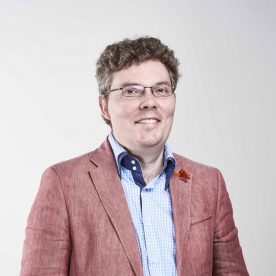
Dr James Tickner, Chrysos Corporation Ltd
Gold-standard entrepreneur
Dr James Tickner’s invention, PhotonAssay™, uses X-ray technology to detect gold, silver, copper and other elements in mineral ores.
In the mining industry, quantifying the concentration of a target element in a sample is crucial. In developing PhotonAssay™, James overcame many of the safety, environmental and efficiency problems of older, more harmful and hazardous detection methods.
PhotonAssay™ technology counts atoms inside rocky samples in a matter of minutes, whereas previous assaying processes could take weeks. Furthermore, the innovative approach minimises health risks for operators, and eliminates toxic waste, while also halving energy consumption and carbon emissions compared to existing methods – making it safer for workers, and better for the planet.
James developed PhotonAssay™ while working at CSIRO, and left his research role to commercialise the technology. He co-founded the mining technology start-up Chrysos Corporation Ltd, where he continues to lead the science, engineering and product development teams. In just six years, as Chrysos’ Chief Technology Officer, James has overseen the growth of PhotonAssay™ from its first functional unit to a fleet of commercially operating units across three continents running approximately 300,000 samples per month.
Traditional Knowledge Innovation Award
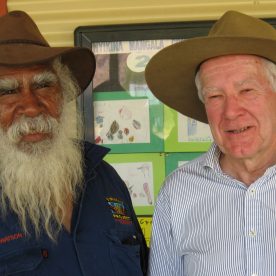
John Watson, Nyikina Mangala Community & Professor Ron Quinn AM FTSE, Griffith University
Partners in traditional pain treatment
In 1986, John Watson’s finger was bitten off by a crocodile. A Nyikina Mangala man from the Jarlmadangah Burru Aboriginal Community of the Kimberley, John turned to the bark of the Mudjala mangrove tree seeking pain relief. He chewed on a strip of bark and applied it as a dressing to his wound.
When Professor Ron Quinn from Griffith University heard of John’s ordeal, and his use of the Mudjala bark, he was intrigued. An enduring partnership eventuated between the Nyikina Mangala people and Griffith University under the leadership of John and Ron, seeking to identify what active compounds could be present in the bark.
Combining thousands of years of Traditional Knowledge with western science has revealed a novel, natural remedy for the treatment of severe pain. The bark contains two classes of compound: one is effective for inflammatory pain and the other mitigates sciatic nerve injury. The resulting product – a possible topical gel – will be based on the complex mixtures present within the bark paste. John and Ron hope that this gel could be supplied to athletes at the 2032 Brisbane Olympics.
The project is powerful not only for its outcomes, but also its approach in retaining traditional ownership and respect for the integrity of traditional knowledge.
Batterham Medal for Engineering Excellence

Dr Conrad Wasko, University of Melbourne
Climate trailblazer
As a hydrological engineer, Dr Conrad Wasko has transformed our understanding of how climate change will affect floods.
Ten years ago, the scientific community knew little about the relationship between climate change and flooding. Conrad’s world-leading research has filled this global knowledge gap, discovering that we won’t see universal increases in flood events with the changing climate. Conrad has found that small floods—those that fill up water supplies—are decreasing and in contrast, larger damaging flood events are becoming more frequent.
Conrad was also the first to conclusively show that storms intensify as temperatures increase. This has implications for urban flooding as intense rainfall in concreted urban areas can result in flash floods.
A senior lecturer at the University of Melbourne and Australian Research Council Fellow, Conrad’s discoveries are helping us adapt to and mitigate changing flood and water patterns. His clear communication of complex uncertainty informs engineering recommendations and updated flood guidance across Australia.
David & Valerie Solomon Award
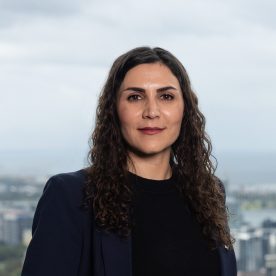
Dr Marzi Barghamadi, CSIRO
Lithium battery scientist
Dr Marzi Barghamadi is a Research Scientist at CSIRO Manufacturing leading the Battery Materials and Design team. She works across a variety of different energy storage devices and tackles some of the biggest challenges in battery research by improving the cycle life and safety of lithium batteries.
Lithium-ion batteries are found in everyday life – powering our phones, laptops and electric vehicles. While they are fast and easy to charge, lithium-ion batteries have limited energy density. Marzi is collaborating across multiple leading industries to enhance the energy density of batteries, which will have the potential to store more energy and deliver increased power. She is the co-inventor of a power optimised lithium-ion energy storage device.
Through her research on lithium-sulfur batteries, she has made significant progress towards improving the safety of this emerging energy storage technology using alternative electrolyte additives and solvents.
An advocate for women in STEM, Marzi has won multiple awards including the prestigious L’Oréal-UNESCO For Women in Science Fellowship in 2020, and a Clean Energy Council’s Chloe Munro Scholarship for emerging female leaders in 2021.
ICM Agrifood Award
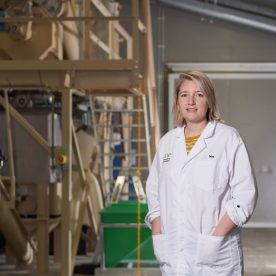
Dr Natalie Morgan, Curtin University
Poultry nutrition researcher
Dr Natalie Morgan has shaped how the poultry industry formulates diets for both egg-laying and meat chickens. Her research revealed the importance of fibre – a nutrient historically overlooked in poultry diets. Natalie developed a database of accurate fibre values to help poultry nutritionists improve accuracy when formulating feed that boosts birds’ health and productivity.
Natalie has also investigated prebiotics, carbohydrates that fuel beneficial bacteria in the gut. Fueling these good gut bacteria can enhance nutrient absorption, and Natalie has shown that prebiotics can actually reduce nutrient waste in poultry feed. Her innovative efforts have focused on making and measuring prebiotics – including from human food waste products – and how best to supplement them into poultry diets.
A leader in both academia and industry, Natalie’s portfolio extends into community engagement. She developed a training program in NSW to help unemployed young people find opportunities in the poultry industry and is a mentor to young women in STEM.
ICM Agrifood Award
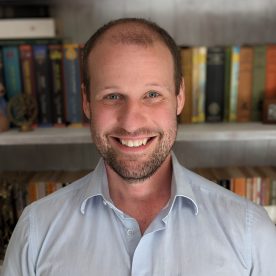
Dr Benjamin Holman, NSW Department of Primary Industries
Meat science maestro
Dr Benjamin Holman’s award-winning work on Australian beef and lamb has cemented his place as an international leader in meat science.
Benjamin’s rigorous research has enhanced the sustainability of the beef and lamb industry. He has analysed packaging options to improve shelf life, investigated how to speed up the resource-intensive meat ageing process, and identified refrigeration and freezing storage conditions with reduced environmental footprints that still deliver quality meat.
Benjamin’s research feeds seamlessly into best-practice recommendations for farmers. For example, Benjamin’s analysis of novel livestock feed ensures that any resulting meat is safe, high quality, and rich in the nutrients needed for a balanced human diet.
Recently, Benjamin undertook a ground-breaking review of meat freshness standards, and defined a new, lower spoilage threshold for beef – the point at which beef crosses from fresh to not ideal for human consumption. The study also demonstrated that Australian beef stays fresher for longer – a finding that improves market access and boosts the international reputation of Australian meat products.
Ezio Rizzardo Polymer Scholarship
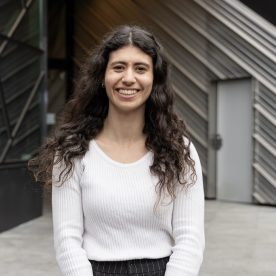
Laila Halim, Monash University
Plastic to fantastic engineer
Laila Halim is passionate about sustainable engineering and creating a healthier planet for future generations. As a first-year PhD candidate at Monash University, she is putting her engineering expertise to work on the plastic waste problem.
When advanced recycling techniques are applied to plastic waste, a complex mixture of smaller chemical components is obtained. Laila’s PhD project investigates how to filter out the useful components using polymeric membrane materials, in place of traditional high energy means of separation. Once isolated, the useful chemical constituents of plastic waste can be valorised into new products across various industries. She is particularly interested in finding ways to upcycle plastic waste for use in the green energy industry.
Laila’s research treats plastic waste as an opportunity rather than a burden and contributes to Australia’s circular economy aspirations. She holds a Bachelor of Engineering and a Bachelor of Science and has a stellar academic record with numerous Dean’s List commendations and scholarships. Laila is strongly community minded, evidenced through her work with the Tech Girls Movement Foundation and Engineers Without Borders.
Ezio Rizzardo Polymer Scholarship
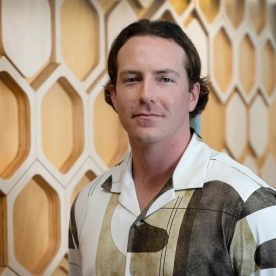
Bailey Richardson, Queensland University of Technology
Polymer paradigm-shifter
Bailey Richardson is a PhD student at Queensland University of Technology.
Inspired by the relationship between light and biology which affords processes such as photosynthesis, Bailey aims to understand the natural designs that allow certain biopolymers to use light efficiently.
By taking inspiration from these designs, he creates novel polymers that can interact with light in similarly specific ways. These materials hold potential to advance our understanding of cellular processes and lead to new ways to diagnose and treat diseases.
With an exceptional academic record and several awards earned during his undergraduate career at Queensland University of Technology, PhD candidate Bailey is well-equipped to take on this polymer challenge. He’s also passionate about science community building, co-founding the QUT chemistry club.
ATSE President’s Medal
Peter Laver AM FTSE
Academy impact champion
Peter Laver AM FTSE has been an integral part of ATSE’s progress as a modern Academy. A previous Vice President, Peter played a leading role in developing the agile and future-focused Board and Assembly structure that exist today, which pays respect to the Academy’s origins and traditions. After his tenure as Vice President, he became a Senior Advisor to the Academy and has contributed to several Strategic Plans, policy documents, submissions and Government Inquiries.
Peter was elected in 1992 in recognition of his dedication to fostering industry and academic collaboration through his various managerial roles at BHP over 40 years. He has held many positions as chair and advisor. In 2005, he received a Member of the Order of Australia for service to Industry, Tertiary education and training, and Science and Technology.
As a lifelong learner, he is an advocate for investment in training and education.